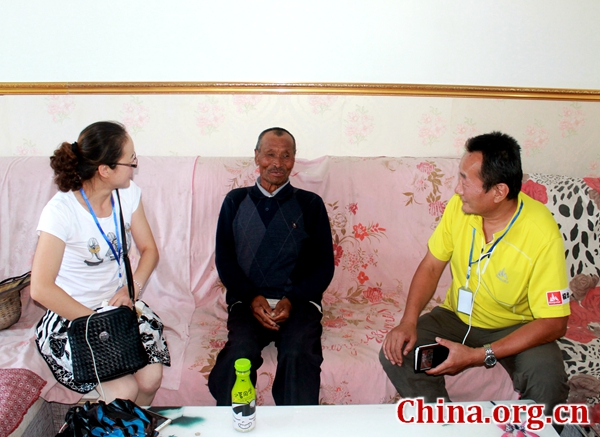
|
|
Liu Fu, a 69-year-old migrant villager, talks with journalists about his livelihood. [Photo by Mi Xingang/China.org.cn]
|
"Thanks to the migrant work program, we now live in a much better environment and enjoy better lives," said Liu Fu, a 69-year-old villager now living at Yuanlong Village of Minning Town in Yinchuan City, Ningxia Hui Autonomous Region, during an interview with China.org.cn.
Before 2012, Liu Fu had been living at Diwan Village of Chong'an Town in Longde County, considered to be an uninhabitable area for human beings by the Food and Agriculture Organization of the United Nations in 1972. On May 23, 2012, 147 families living there were transferred to Yuanlong Village by 27 trucks; Liu's family was among the group.
From May of 2012 to September of 2014, a total of seven batches of 1,987 families were moved from 13 towns in Guyuan City to Yuanlong Village, where they were offered water, electricity and other amenities. With years of construction, hospitals, kindergartens, schools, bazaars and cultural activity centers have been set up at Yuanlong village.
No longer combating harsh weather and drought, Liu said that his life is now better and that has health insurance.
Over the past three years, Yuanlong Village has fostered grape planting, photovoltaic agriculture, beef rearing and raspberry planting to increase the villagers' income.
This year marks the 20th anniversary of eastern China's Fujian Province's dedication to poverty alleviation in Ningxia Hui Autonomous Region through allocating funds, making investments, dispatching human resources and establishing enterprises.
Minning Town, which was established in Ningxia in 1996, has witnessed support from Fujian for 20 years. Some 60,000 farmers have emigrated from remote mountainous areas into Minning Town under the support of Fujian. The enterprises introduced from Fujian have also created a lot of job opportunities for local people. The per capita annual net income at the town has increased from 500 yuan in 1996 to 10,350 yuan in 2015.





